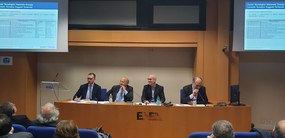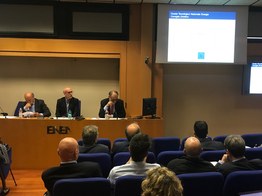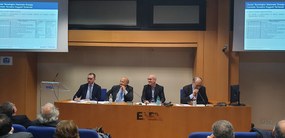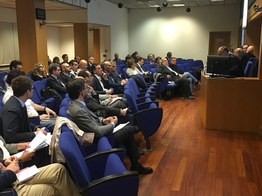Energy: Italian cluster starts up with 72 partners, and 2 million euros for smart grids and concentrating solar power
20/6/2019
ENEA presides over the Board of Directors made up of Eni, Enel, Terna, GE, CNR, RSE, EnSiEL, and the Lombardy Energy Cleantech Cluster
 The “Energy” National Technology Cluster is starting up its operations. The Cluster brings together 72 business concerns, university and research players and local authorities. Its aim is to create openings for technological development for the country’s energy system. The Board of Directors includes Eni, Enel − and its concern, e-distribuzione −, General Electric-Nuovo Pignone, Terna, CNR, RSE, EnSiEL, Lombardy Energy Cleantech Cluster and ENEA. Through Engineer Gian Piero Celata, ENEA presides over this entity. Celata is director of the Department of Energy Technologies. The coordinator of the Technical Scientific Committee is Engineer Giorgio Graditi, heading ENEA’s Solar Thermal, Thermodynamic and Smart Network division.
The “Energy” National Technology Cluster is starting up its operations. The Cluster brings together 72 business concerns, university and research players and local authorities. Its aim is to create openings for technological development for the country’s energy system. The Board of Directors includes Eni, Enel − and its concern, e-distribuzione −, General Electric-Nuovo Pignone, Terna, CNR, RSE, EnSiEL, Lombardy Energy Cleantech Cluster and ENEA. Through Engineer Gian Piero Celata, ENEA presides over this entity. Celata is director of the Department of Energy Technologies. The coordinator of the Technical Scientific Committee is Engineer Giorgio Graditi, heading ENEA’s Solar Thermal, Thermodynamic and Smart Network division.
 The statutory bodies were approved by the Assembly convened today in Rome at ENEA’s head office. The Cluster’s work has also been recognized by the Ministry of Education, University and Research (MIUR), and it receives the support of 15 regional government authorities and of the Autonomous Province of Trento.
The statutory bodies were approved by the Assembly convened today in Rome at ENEA’s head office. The Cluster’s work has also been recognized by the Ministry of Education, University and Research (MIUR), and it receives the support of 15 regional government authorities and of the Autonomous Province of Trento.
The first two pilot projects − approved and funded with a total of around 2 million euros − regard development of technologies for, on the one hand, smart grids and energy storage, and, on the other, production of electricity and thermal energy via concentrating solar energy.
 According to the President of ENEA, Federico Testa, “This is a very positive result, because, in a Cluster, public and private research can work side by side in a closely synergic manner, with the shared goal of turning technological innovation into a strategic driver for lowering costs and enhancing the competitiveness of businesses, starting out from the SMEs that must grapple with the large energy prices gap with the rest of Europe”. He also stresses the importance of “bolstering collaboration and coordination among companies in this sector, including players engaging in induced activities, universities and the ambit of research, in order to foster development of a national technological innovation chain”.
According to the President of ENEA, Federico Testa, “This is a very positive result, because, in a Cluster, public and private research can work side by side in a closely synergic manner, with the shared goal of turning technological innovation into a strategic driver for lowering costs and enhancing the competitiveness of businesses, starting out from the SMEs that must grapple with the large energy prices gap with the rest of Europe”. He also stresses the importance of “bolstering collaboration and coordination among companies in this sector, including players engaging in induced activities, universities and the ambit of research, in order to foster development of a national technological innovation chain”.
 “One of the priority objectives is to carry out pilot projects concerning all facets of innovation in the field of energy on a metropolitan/regional level, while sustaining scientific and technological research and consolidating research infrastructures and technology transfer, in order to optimally meet the needs and expectations of national production chains”, adds Gian Piero Celata, President of the Cluster and the Director of ENEA’s Energy Technology department.
“One of the priority objectives is to carry out pilot projects concerning all facets of innovation in the field of energy on a metropolitan/regional level, while sustaining scientific and technological research and consolidating research infrastructures and technology transfer, in order to optimally meet the needs and expectations of national production chains”, adds Gian Piero Celata, President of the Cluster and the Director of ENEA’s Energy Technology department.
“The ultimate goal is researching, developing and bringing to fruition the next generation of innovative energy technologies, products and services in order to support the process of decarbonizing the energy system, while lowering costs and enhancing safety and resilience for the system. Improving energy infrastructures and services for the community is a priority, and an opportunity for sustainable development and economic growth”, says Giorgio Graditi, the coordinator of the Cluster’s Technical Scientific Committee and head of ENEA’s Solar Thermal, Thermodynamic and Smart Network division.
 This “Energy” cluster is one of the twelve clusters launched in Italy since 2012 to oversee the priority technological areas toward which the Government intends to channel industrial research policy efforts. The other National Technological Clusters (NTCs) handle Aerospace; Agrifood; Green Chemistry; Smart Factories; Land and marine surface mobility means and systems; Life Sciences, Technologies for living environments; Technologies for Smart Communities; Technologies for Cultural Heritage; Design, Creativity and Made in Italy; and Maritime Economy.
This “Energy” cluster is one of the twelve clusters launched in Italy since 2012 to oversee the priority technological areas toward which the Government intends to channel industrial research policy efforts. The other National Technological Clusters (NTCs) handle Aerospace; Agrifood; Green Chemistry; Smart Factories; Land and marine surface mobility means and systems; Life Sciences, Technologies for living environments; Technologies for Smart Communities; Technologies for Cultural Heritage; Design, Creativity and Made in Italy; and Maritime Economy.
NTCs are open, inclusive networks formed by key public and private players operating nationally in the fields of industrial research, training and technology transfer (companies, universities, public and private research institutions, start-up incubators and other innovation players). Each aggregation focuses on a specific technological and applicative field that is considered strategic for Italy, presenting as the most authoritative point of reference in that field, in terms of skills and knowledge base, structures, networks and potentials.
